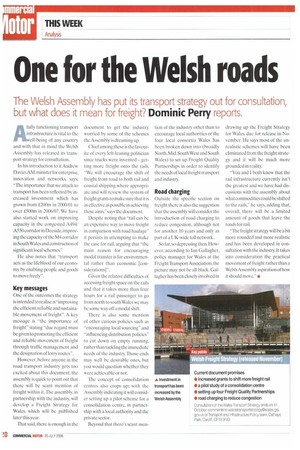One for the Welsh roads
Page 20

If you've noticed an error in this article please click here to report it so we can fix it.
The Welsh Assembly has put its transport strategy out for consultation, but what does it mean for freight? Dominic Perry reports.
Avfully functioning transport infrastructure is vital to the ell-being of any country and with that in mind the Welsh Assembly has released its transport strategy for consultation.
In his introduction to it Andrew Davies A M,minister for enterprise, innovation and networks. says: "The importance that we attach to transport has been reflected by increased investment which has grown from £200m in 2000/01 to over £500m in 2006/07. We have also started work on improving capacity in the congested A494/ A550 corridor in Deeside,improving the capacity of the M4 corridor in South Wales and construction of significant local schemes."
He also notes that "transport acts as the lifeblood of our economy by enabling people and goods to move freely".
Key messages
One of the outcomes the strategy is intended to realise is "improving the efficient, reliable and sustainable movement of freight". A key message is "the importance of freight" stating -due regard must be given to promoting the efficient and reliable movement of freight through traffic management and the designation of lorry routes".
However, before anyone in the road transport industry gets too excited about this document, the assembly is quick to point out that there will be scant mention of freight within it. The assembly, in partnership with the industry, will develop a Freight Strategy for Wales, which will be published later this year.
That said, there is enough in the document to get the industry worried by some of the schemes the Assembly is dreaming up.
Chief among these is the favourite of every left-leaning politician since trucks were invented getting more freight onto the rails. "We will encourage the shift of freight from road to both rail and coastal shipping where appropriate and will review the system of freight grants to make sure that it is as effective as possible in achieving these aims," says the document.
Despite noting that "rail can be an expensive way to move freight in comparison with road haulage" it persists in attempting to make the ease for rail, arguing that "the main reason for encouraging modal transfer is for environmental rather than economic [consi derations]".
Given the relative difficulties of accessing freight space on the rails and that it takes more than four hours for a rail passenger to go from north to south Wales we may be some way off a modal shift.
There is also some mention of other curious policies such as "encouraging local sourcing" and "influencing distribution policies" to cut down on empty running, rather than tackling the immediate needs of the industry. Those ends may well be desirable ones, but you would question whether they were achievable or not.
The concept of consolidation centres also crops up; with the Assembly indicating it will consider setting up a pilot scheme for a consolidation centre, in partnership with a local authority and the private sector.
Beyond that there's scant men tion of the industry other than to encourage local authorities or the four local consortia Wales has been broken down into (broadly North, Mid. South West and South Wales) to set up Freight Quality Partnerships in order to identify the needs of local freight transport and industry.
Road charging
Outside the specific section on freight there is also the suggestion that the assembly will consider the introduction of road charging to reduce congestion, although not for another 10 years and only as part of a UK-wide toll network.
So far, so depressing then. However, according to Ian Gallagher, policy manager for Wales at the Freight Transport Association, the picture may not be all black. Gallagher has been closely involved in drawing up the Freight Strategy for Wales, due for release in November. He says most of the unrealistic schemes will have been eliminated from the freight strategy and it will be much more grounded in reality.
"You and I both know that the rail infrastructure currently isn't the greatest and we have had discussions with the assembly about what commodities could be shifted to the rails," he says, adding that, overall, there will be a limited amount of goods that leave the roads for rail.
"The freight strategy will be a bit more rounded and more realistic and has been developed in consultation with the industry. It takes into consideration the practical movement of freight rather than a Welsh Assembly aspiration of how it should move." •
























































































































































































